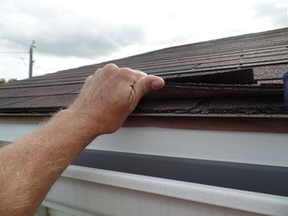 6 areas where home inspectors can help home sellers No matter how much a buyer loves your property, a home inspection that reveals major problems can change their mind about buying your home. The buyer’s contract usually allows a time period, commonly ten days, to get a home inspection and back out of the contract in the event unacceptable problems are discovered. Commonly, the buyer may still want your home, but a bad report will move them into the driver’s seat as far as negotiations are concerned. Because so much rides on a successful home inspection many experts recommend you have an inspection performed before even putting your home on the market. Hiring a licensed inspector to perform a prelisting inspection may identify any surprise issues you don't know about which could delay your closing date or, worse, cause your buyer to walk away. The following 6 items are common areas of a home where inspectors find problems that can be taken care of prior to listing with a realtor. 1. Electrical Flickering or dimming lights could indicate your electrical system is not working properly. This could be a poor connection or one of several other common problems. Since it can be dangerous further evaluation is warranted. Electrical outlets near any wet area such as in the kitchen or the bathrooms should not be within 6 feet of water unless they are GFCI (ground-fault circuit interrupter) outlets. These electrical outlets are designed to trip at the slightest hint of a short that can be caused by wet hands or electrical items such as hair dryers falling into the water. They are a very effective safety device. Modern building codes require the outlets outside, in garages, and basements. While existing homes are not required to be brought up to modern codes a knowledgeable home inspector can identify the need for necessary safety repairs. “Many older homes have two-prong or non-grounded outlets which are safe and widely used. A qualified inspector can inspect these outlets and make necessary recommendations. Having a qualified inspector or electrician inspect and certify the electrical system is safe can prevent an overzealous home inspector working for the buyer from recommending major, expensive repairs, that your buyer may insist on. 2.Plumbing I am frequently surprised by the cost of common plumbing repairs. A plumbing inspection is not very complicated. Sinks, tubs, and showers should drain properly. Drain stoppers should work properly. Faucets should not leak and the same goes for the drains and supply lines under the sinks. Toilets should flush properly and should not continue to run. Around the toilet should be inspected to insure the toilet tank or the bowl seal is not leaking. The inspector will look at the exposed water supply lines including the main water line and shut-off. The hot water heater will be inspected. The exposed drain lines will be inspected. Many times, a knowledgeable inspector can make recommendations for repairs that a handy home owner can handle. 3. Roof When a home inspector looks at your roof, he is inspecting everything from your roofing material to your gutters, vents, and downspouts. He is also looking at the roof’s structure and the chimney. If there are any signs of cracks and leaks, or shingles that have blown off, this will be noted. It is common for home owners to have no idea of the condition of their roof. Many times, I have inspected roofs to find hail damage that the owner’s insurance can take care of. Other repairs that are needed are as simple as applying some caulking or the replacement of a few shingles. Common roof maintenance can extend the roof’s life expectancy by years if needed. 4. Mold In this article the natural succession of problems your home may have is mold. The common symptom of plumbing or roof problems is water leaks. A mold problem is a water problem. Mold must have it to exist or grow. One of the top deal breakers for a home sale would be suspected mold. Because of the attention it has received from the media people are terrified of it. Accompanying mold is a musty odor. Home inspectors certified to inspect for mold are trained to use their nose first. That musty smell can be responsible for turning the prospective buyer off the home before the contract is even considered. Any issue with mold should be addressed prior to selling. The good news is mold is not nearly as difficult to deal with as might be expected. In many instances it can be cleaned up with soap and water. Find an inspector that is well educated on the subject. Be careful consulting a company that specializes in mold remediation and may be after an expensive remediation job. For more information see www.laselleck.com/mold-and-allergen-testing.html. 5. Window and doors Don't forget the simple home components that could prove problematic during a home inspection. An example is your home's windows and doors. During the inspection of the windows and doors, the home inspector will be looking for the ease of operation and defects. It goes without saying broken windows should be repaired. However, don’t under estimate cleaning and WD 40. Check weather stripping, door knobs, and door stops. 6. Floors walls and ceilings Most any home owner can look around and tell if new carpet or flooring is needed and the same goes with paint and wallpaper. A home inspector will look beyond finishes. He will look for cracks in the walls and ceilings and help the seller understand the difference between common cracks and those that might show movement in the home’s structure. Some cracks may be easily repaired with caulk and paint while others may require replacement of wall or ceiling panels. While walking through the home an inspector will look for uneven areas in the floor that may be more than just worn out flooring. An alert home inspector many times can pick up on evidence of structural problems. The bottom line It is understood that many times when getting ready to sell a home, sellers do not have or don’t want to use the money needed to call in a home inspector and make repairs recommended on the report. The fact is though, sellers who do get the needed help and make the needed repairs find the property sells faster and for more money. Realtors are aware of the need to have the property in tip top shape. Realtors will often recommend repairs when they meet with you for the listing. I have seen many realtors play the part of a home inspector. The simple reason is they make their living by selling your property and as stated a home in tip top shape sells for more money and brings bigger commissions. You no doubt have heard of or watched programs on television about house flippers. The ability to flip a house for profit is because a house in excellent shape brings more money than one in need of repairs. The profit is from the difference in price above the cost of the repairs and the final price of the home. That is the situation in a standard home sale as well. The question is are you going to put that money in the bank or is the buyer? You may notice in my articles I usually refer to a male home inspector. It is just habit and ease of writing. While most inspectors in my area are male there are good female home inspectors. When choosing an inspector, it is my opinion he or she should have an extensive background in the construction industry. It is especially helpful for sellers if they have experience in selling homes. An unqualified inspector can recommend unnecessary repairs that can eat up your profit. I welcome your comments and would be happy to answer your questions. www.laselleck.com
0 Comments
 How to choose a good home home inspector Before you buy a home, it is always a good idea to get a home inspection. It is common for a purchase contract to give a period, usually ten days, to get all your inspections done. If major problems are discovered by your inspector you can cancel the contract, get your deposit back and walk away from the deal. Based on the findings you can negotiate with the seller to cut the price or have repairs made. Even if the results of the inspection mean you agree to accept the house as-is at the contract price, a good home inspection can give you valuable insights into your future home and help you plan for future maintenance and repairs. One thing the inspector should not tell you is whether you should buy the house or not. A good inspection should give you enough information that you can make an educated decision on your own. To get the most from your home inspection, plan to be present the entire time, which usually lasts two to four hours, depending on the size of the home, its condition and how many questions you ask. A good inspector will give you all the time you need. A home inspector is unlikely to give you specific estimate for repairs, but he or she can usually give you advice on whether a needed repair will be a large or a small job. In most areas, a home inspection costs $300 to $600, which varies by individual pricing as well as the size and age of the house. That does not include specialized inspections. Depending on the house and where you live, you may also need inspections for radon, mold, septic systems, and sewer scopes. A good home inspector can do some of those inspections for an additional fee and should be willing to make recommendations to get the best service and the most expertise for his client. Before you hire an inspector, ask how long after the inspection it will take to get the report. Some inspectors give you the report on the spot, though that could require hanging around while the inspector writes it up, and others email it within a day or two. Timing is important because most contracts include an inspection deadline. You should expect the report within about 24 hours. Your Realtor is likely to give you the names of one or more home inspectors, and that’s a good place to start. Be careful if your Realtor insists on just one inspector. Call and interview those inspectors, look at their websites and check out their reviews. You can Google “home inspections” and get a list of inspectors. The same rules apply, be careful. Good questions to ask are: How long have you been an inspector? What did you do before you started? Do you have a background in construction? The American Society of Home Inspectors, which has training requirements for its members and a professional code of ethics, lets you search for an inspector by geography on its website. Members of the nonprofit organization must pass an exam and do continuing education to retain their membership. The National Association of Home Inspectors has similar requirements and an online search function. InterNACHI, whose members also must pass an exam and adhere to professional standards, provides free online continuing education courses for inspectors, several helpful booklets for homeowners and operates an online forum where consumers can ask questions. The organization also provides online referrals to member inspectors. Here are eight ways to find the best inspector, plus get the most out of your home inspection: Ask for a sample report. Any good home inspector should have their home inspection report displayed on their website. See if the reports are clearly written and how they are formatted. I recently had a client that said the inspector for her previous home purchase provided a report that was more than 60 pages long. We are all too busy for that, you don’t need a book. You should be able to scan the first few pages and see exactly what you should be concerned about. The rest of the report should go into detail with pictures. A good report should be about 25 or so pages long. Choose an inspector who wants you around during the entire inspection. The client should always feel free to be at the inspection. I have clients that stick right next to me through the entire process. Others just sit and wait. Bottom line it should not be a hurried affair. Ask questions and relay your concerns. Read reviews and check the Better Business Bureau. A good inspector should have built up some reviews. If not check with past clients. The Better Business Bureau has a terrific website and an “Accredited BBB” inspector has had a background check. Finally, who doesn’t love Google. If an inspector hasn’t been doing a good job usually Google knows. Ask if the inspector is a member of ASHI, NAHI, InterNACHI or any other professional certification association. Choosing an inspector who belongs to a professional organization isn’t a guarantee of quality, but it does indicate a degree of professionalism and training. Ask about experience and background. How long has the inspector been in business? How many inspections has he or she done? Has he or she taken specialized courses? Make sure you hire someone who does inspections full time rather than as a side job. In my opinion an inspector that comes with a construction background and knows what is going on behind the walls so to speak and will generally do you a better job. For an example cracks in drywall are common. An inspector that knows about the structure will recognize a crack that is not normal and that could mean a problem with the foundation or another part of the structure. He will recommend further evaluation for your protection. On the other hand, you don’t want an inspector that recommends further evaluation based on every crack he sees. Ask what won’t be included and how to find out the condition of those items. In colder climates, for example, the roof, deck, patio, driveway and other exterior features can’t be inspected when they are covered with snow. A good inspector should work with you. No one likes to make extra trips sometimes we do what we need to do. That should be the attitude of your inspector. Get copies of license and insurance documents. Many, though not all, states require home inspectors to be licensed. Some municipalities may also require licensing. A qualified home inspector will provide copies of his or her license and proof of insurance. Better yet they should be posted on his or her website. Ask if the inspector can do ancillary inspections. A good inspector should cover most of the necessary inspections. He should also show some humility, if someone else can do a better job he should recommend that. For example, the only way to inspect a septic tank is to pump it out and look. An inspector who wants to flush dye down your toilet and let your water run for 3 or 4 hours wants your money. For more information about my services see www.laselleck.com |
Larry SelleckMy goal is to have a series of articles that deal with items that may be found on the home inspection report. There will also be articles on choosing a home inspector and a realtor. This information will be based on my experience in the construction industry as well as information I research. I welcome your comments. If you have a question or would like to see an article on a particular subject please ask. Categories
All
Archives
March 2019
|
|
L. A. Selleck Inspections and Consulting
22052 W. 66th St. Ste. 162 Shawnee, KS 66226 913-730-6402 and 785-640-5704 |
Serving The Entire Kansas City Area And Surrounding Towns And Communities Including, Lawrence, Topeka, Overland Park, Shawnee, Lenexa, Olathe, Tonganoxie, Leavenworth, Atchison, Holton, Manhattan, Gardner, Louisburg, Paola, and many others
|
Copyright © 2018
